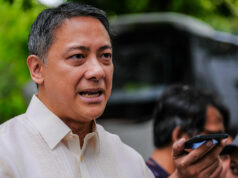CONGLOMERATES have the resources to play a bigger role in helping achieve the goal of inclusiveness amid the weakness of national institutions, National Scientist and economist Raul V. Fabella said.
Mr. Fabella delivered his assessment during the third Paderanga-Varela Memorial Lecture of the Foundation for Economic Freedom (FEF) at the Dusit Thani Manila in Makati City. His lecture was drawn from his recent book titled “Capitalism and Inclusion under Weak Institutions.”
“Conglomerates have the considerable capacity for collective action, and they have shown it. Now, they have resources, they have expertise, they have organization. They can raise capital within,” he said.
“Building on what we have, we already have a clutch of conglomerates. Rather than diminish them, we can rechannel them. That of course is a very difficult mission. But when they are enlisted, as we have in certain circumstances, they can greatly boost the weak’s states capacity for public goods provision,” he added.
Mr. Fabella cited China under Deng Xiaoping for being able to carry out poverty reduction programs. However, he pointed out that China was successful in addressing poverty because it had strong institutions, a feature that many less developed countries lacked.
In the Philippines, the economist said conglomerates are best partners for the government to ensure inclusive growth, citing the Metropolitan Waterworks and Sewerage System (MWSS) privatization and the Public-Private Partnership (PPP) programs.
“The incapacity of the state to provide public goods could be helped along by enlisting conglomerates towards that. This is not a pipe dream. This has happened already. It’s already part of our history. So we did that for MWSS privatization. We’re doing it for CaLaX (Cavite-Laguna Expressway), TPLEx (Tarlac-Pampanga-La Union Expressway), and NAIAx (Ninoy Aquino International Airport Expressway),” he said.
“So it’s already a reality. We should just simply facilitate doing more of it,” he added.
Mr. Fabella also said competition among conglomerates has empowered consumers by giving them options, which also reduces the burden of Philippine Competition Commission (PCC).
Clairmont Group President and Chief Executive Officer (CEO) Eduardo H. Yap said reliance on conglomerates carries risks as most countries have a large share of small and medium-sized businesses. He also cited the monopolistic practices of some industries, which have formed some of the “structural weaknesses holding down development.”
Stratbase ADR Institute President Victor Manhit said that while “bright economic prospects” boost investor confidence, corruption and red tape in the bureaucracy have stifled business growth and pulled down the Philippines’ competitiveness ranking. With corruption rooted in the electoral system, Mr. Manhit called for policy-based political discourse in the upcoming midterm 2019 elections.
“We must advocate for program-based and policy-intensive political discourse to test the leadership potential of not only the candidates but this administration also,” he said.
University of the Philippines (UP) political science professor Amado M. Mendoza, Jr. said the country’s challenge in achieving the inclusive growth was Duterte’s administration’s politics and economics, as Mr. Fabella cited.
Mr. Fabella had warned during the lecture that the inconsistencies between the political and economic policy of the administration have been clouding the waters for investment, raising uncertainty.
Mr. Mendoza added: ”Can inclusive growth, can inclusive institutions (happen) in an atmosphere where the politics is divisive?… Can (Finance Secretary Carlos G.) Dominguez III’s economics trump Duterte’s politics? That’ a question and a challenge that we have to confront and we will have to confront it as soon as possible in the 2019 elections.” — Camille A. Aguinaldo



